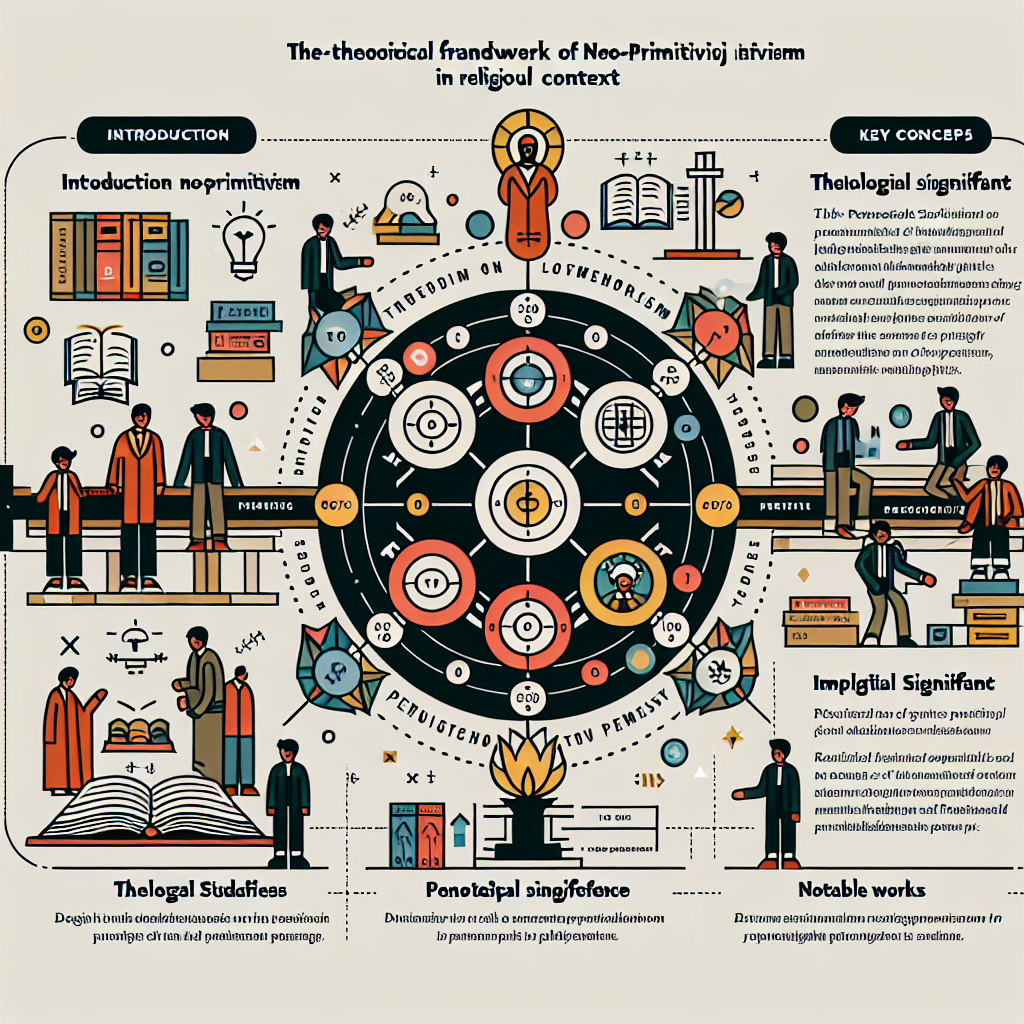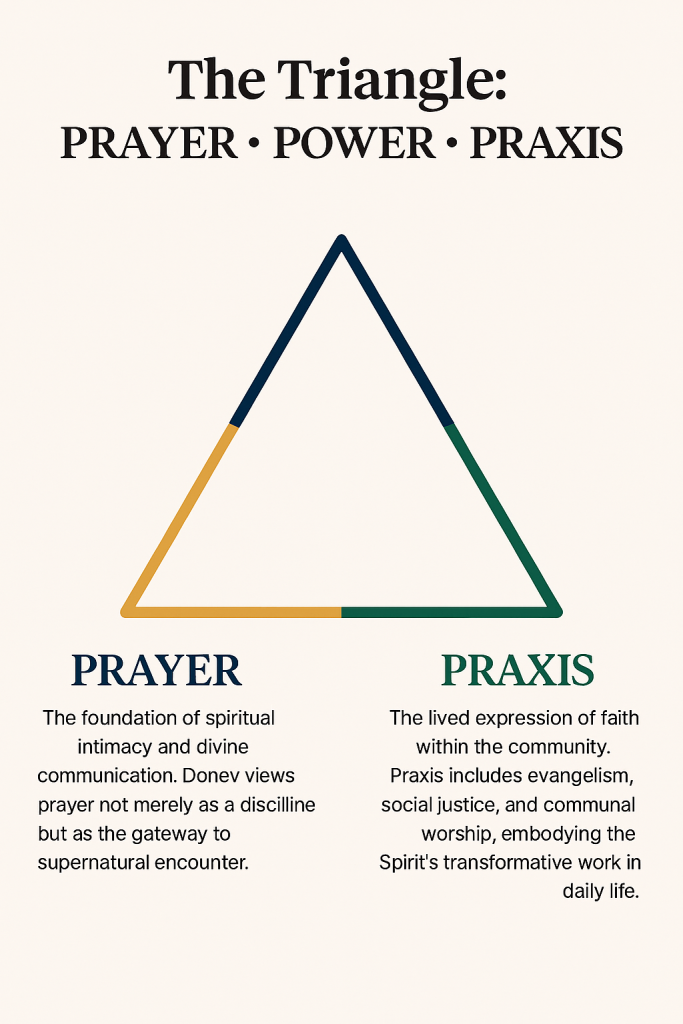Pentecostal Framework of Primitive Faith: Comparative Insights from Leading Pentecostal Scholars
Gordon Fee: Scripture-Centered Pneumatology
Fee’s scholarship emphasizes the Spirit’s role in New Testament theology, particularly in Pauline writings. While he critiques traditional Pentecostal doctrines like initial evidence, he affirms the Spirit’s transformative presence. Compared to Donev, Fee’s approach is exegetical and text-driven, whereas Donev’s triangle is experiential and restorationist, prioritizing lived encounter over doctrinal precision.
Stanley M. Horton: Doctrinal Clarity and Holiness
Horton’s work, especially in Bible Doctrines, provides a systematic articulation of Pentecostal beliefs, including Spirit baptism and sanctification. His theology is deeply rooted in Assemblies of God tradition. Donev de-emphasizes denominational boundaries, focusing instead on the primitive church’s egalitarian and Spirit-led ethos.
Craig Keener: Charismatic Experience and Historical Context
Keener bridges academic rigor with charismatic openness, especially in his work on miracles and Acts. His emphasis on historical plausibility and global charismatic phenomena aligns with Donev’s praxis-driven model. However, Keener’s scholarship is more apologetic and evidential, while Donev’s triangle is formational and communal.
Frank Macchia: Spirit Baptism and Trinitarian Theology
Macchia’s theology centers on Spirit baptism as a metaphor for inclusion and transformation, often framed within Trinitarian and sacramental lenses. Donev shares Macchia’s Trinitarian depth, especially in Eastern European contexts, but leans more toward neo-primitivism and ecclesial simplicity.
Vinson Synan: Historical Continuity and Global Pentecostalism
Synan’s historical work traces Pentecostalism’s roots and global expansion. Donev builds on this by reclaiming Pentecostal narratives, such as those of Ivan Voronaev. Both emphasize restoration, but Donev’s triangle is more prescriptive, offering a model for future church practice.
Robert Menzies: Missional and Contextual Theology
Menzies focuses on Pentecostal mission and theology in Asian contexts, often challenging Western assumptions. His emphasis on Spirit empowerment for mission resonates with Donev’s praxis element. Yet, Donev’s model is more legitimately communal, drawing from Orthodox and Puritan influences.
Cecil M. “Mel” Robeck: Ecumenism and Pentecostal Identity
Robeck’s work on Pentecostal ecumenism and global dialogue complements Donev’s inclusive vision. Both advocate for Pentecostal distinctiveness without isolation, though Donev’s triangle is more grassroots and revivalist, aimed at local church transformation.
Implications for Church Practice
Donev’s triangle offers a practical blueprint for churches seeking renewal:
- Prayer ministries that foster intimacy and prophetic intercession.
- Power encounters through healing services and spiritual gift activation.
- Praxis initiatives like community outreach, justice advocacy, and discipleship.
Compared to other scholars, Donev’s model is less academic and more actionable, designed to reignite the apostolic fire in everyday church life.

Perry Stone: Prophetic Impact in US-Iran Leading to War
Prophetic minister Perry Stone, in Israel for an upcoming telecast when Iran struck a historic deal Sunday with six world powers over Tehran’s nuclear program, sees prophetic significance in the deal with potential negative impact on the United States.
“My concern is that when America pressures Israel in a negative manner, within 24 hours our weather pattern becomes dangerous, which biblically can be a sign of God’s disfavor,” Stone says. “This has been traced back for years. That’s the thing that we have to be concerned about—our own future as a nation, or our favor with God as a nation, by not supporting people of the covenant.”
However, the evangelist says this situation “could be extremely serious for Israel within the next six months to a year, especially by the fact that everyone [in the Middle East] in intelligence knows that Iran wants nuclear weapons, and once they get them, the whole game changes in the Middle East.”
When asked how the weekend’s agreement fits into end-times prophecy from a biblical point of view, Stone said, “In Ezekiel, the war of Gog and Magog, Persia is involved in that war. I’ve read it very carefully, and it looks as though there’s a pre-war that happens. God turns the Persians back and later puts a hook in their jaw and brings them down on the mountains of Israel.
“In my personal opinion, there are going to be two conflicts—one between the Persians and the Israelis at some point, militarily, whether there’s an air strike of some kind or something similar; and somewhere down the road, there will be retaliation among the Persians with the coalition of Islamic nations mentioned in Ezekiel that will try to come against Israel. But according to the prophet, Israel will win that battle. That’s how I’m looking at this.”
Stone had been in Israel a week when the agreement was announced last weekend. He says the Israelis he talked to are “extremely upset” with the Obama administration.
“They are very upset with President Obama,” he says, “and they are coming out and saying that if you let this go and let the Iranians be unrestrained in their nuclear program, the United States in the future will pay with a nuclear attack on American soil by Islamic radicals. They are publicly coming out and saying this: ‘Don’t blame us when this happens.’”
Stone, director of one of America’s fastest-growing ministries, Voice of Evangelism, says he is not predicting an attack on U.S. soil, only that it could happen with a future Iranian regime using nuclear weapons.
Stone says it is difficult to say what he thinks Obama should have done but notes, “When it comes to the nuclear threat, there has to be a total removing of Iran’s developing and enriching centrifuges, or there has to be an attack on those facilities to set them back for at least several years. The problem is that the regime that is in power will use their weapons against the Saudis, against the Gulf States or against Israel in the very near future.”
But Stone adds that he is not afraid of Israel’s ability to defend itself.
“Suddenly,” he continues, “everyone around them will want a nuclear weapon to defend themselves from the nuclear weapon of their enemies. You’ll have the whole Middle East being nuclear, and that’s the most dangerous thing imaginable.”
The six-month deal includes “substantial limitations that will help prevent Iran from creating a nuclear weapon,” President Barack Obama said in a nationally televised address.
The agreement, which came after days of marathon talks, “addresses Iran’s ability to enrich uranium, what to do about its existing enriched uranium stockpiles, the number and potential of its centrifuges and Tehran’s ‘ability to produce weapons-grade plutonium using the Arak reactor,’ according to a statement released by the White House,” CNN has reported.
In addition, Iran agreed to provide “increased transparency and intrusive monitoring of its nuclear program,” the White House statement says.
Israeli Prime Minister Benjamin Netanyahu, who has consistently asked the West to be wary of any deals with Iran, fiercely criticized the deal.
“What was concluded in Geneva last night is not a historic agreement; it’s a historic mistake,” he told reporters Monday. “It’s not made the world a safer place. Like the agreement with North Korea in 2005, this agreement has made the world a much more dangerous place.”
Leading and Managing a Growing Church
According to George Hunt the three main roles of each pastor of an effective and growing church are:
- Leader communicating the church vision, purpose, and direction
- Manager utilizing people and resources, assigning specific roles, jobs, and tasks, in order to achieve the mission’s purpose.
- Administrator facilitating the flow of the organization and makes sure it is efficient. (p. 26).
The following paper is a basic list of my actions in my present context of ministry grouped according to the above categories.
Leadership
- Creating, providing and consciously supporting a spiritual environment of prayer for leadership decision-making.
- Vision: Receiving the vision for the department and communicating a vision through all existing structures to all people in the department without any exception.
- Purpose: presenting a purpose of the vision – what would be the results of fulfilling the vision.
- Mission: how does the vision compliment the overall mission of the congregation?
- Relationships: relating to people s needs, spiritual growth and transformation.
- Message: in the church context providing a message related to the vision empowering the gifts of the people, encouraging with a hope for the future and at the same time ministering to their present situation personally, in their families as a basic church structure, and in the corporate presence of the church congregation as a community.
- Interacting with existing systems, structures and hierarchy in the church through providing an adequate leadership model in the assignment department.
Management
- Creating, providing and consciously supporting a spiritual environment of prayer for management decision-making.
- Creating an environment for adequate and timely problem solving in relationship to relationships between people and resources or both.
- Forming and continuously developing a dynamical financial strategy in accordance with the overall financial strategy of the congregation that provides for the ministry needs.
- Budget planning as a part of the annual church budget presented by the senior pastor and approved by the pastoral/church council.
- Creating relationships with long and short term sponsors.
- Providing and implementing long and short term fundraiser strategies.
- Finding, creating and building resources providing and adequate model for their purposeful usage.
- Creating annual and/or five-year projections for the further development of the ministry department in accordance with the available resources and the adequately provided leadership plans.
Administration
- Creating, providing and consciously supporting a spiritual environment of prayer for administration decision-making.
- Establishing communication with leaders and members through a variety of mail outs, websites, weekly bulletins, monthly newsletters and presentations.
- Cataloging member profiles in an information database to create a holistic church communication structure, and available for planning an extended church strategy.
- Forming basic structures and systems to aid the youth ministry:
- Volunteer leaders
- Student leaders
- Small groups
- Small group leaders
- Weekly meetings
- Wednesday night leaders
- Sunday school teen program, etc.
- Providing training, feedback and communication with the department structures aiming better results and relationships.
- Participating in church boards, interacting with directors, establishing and executing the proper chain of command.
- Creating and publishing reports and statistics inclusive of results.
- Analyzing the available data, structuring the results with proper feedback and providing a strategic plan for further development of the ministry.








